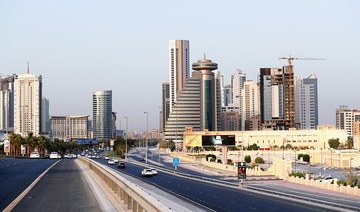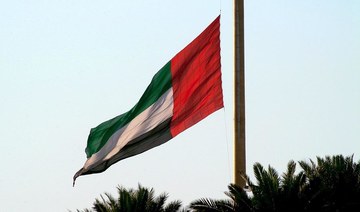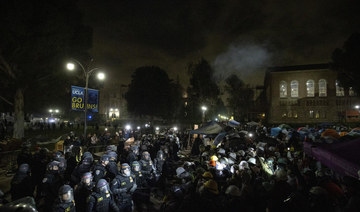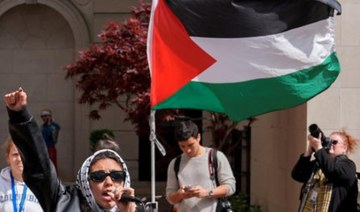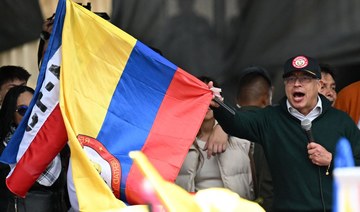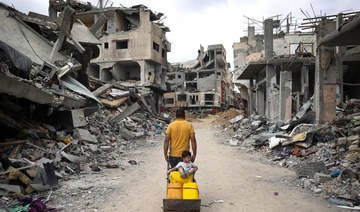MANAMA/JERUSALEM: The first stage of President Donald Trump’s Middle East peace plan will be launched on Tuesday at a conference the White House touts as a bid to begin drumming up $50 billion in investment but which Palestinians deride as an “economy first” approach doomed to fail.
The two-day international meeting in Bahrain, led by Trump’s son-in-law, Jared Kushner, has been billed as the first part of Washington’s long-delayed broader political blueprint to revive the moribund Israeli-Palestinian peace process, which will be unveiled at a later date.
But neither the Israeli nor Palestinian governments will attend the curtain-raising event in the Bahraini capital, Manama.
There will be close scrutiny as to whether attendees such as Saudi Arabia and other wealthy Gulf Arab states show any interest in making actual donations to a US plan that has already elicited bitter criticism from Palestinians and many others in the Arab world.
Bahrain, a close American ally and home to the US Navy’s Fifth Fleet, has been making preparations for weeks.
Although the conference is supposed to focus on economics, Gulf Arab states hope their presence will also show their solidarity with the Trump administration over its hard-line against Iran, a senior Gulf diplomat said on condition of anonymity.
Under the plan, donor nations and investors would contribute about $50 billion over 10 years, with $28 billion going to the Palestinian territories — the Israeli-occupied West Bank and the Gaza Strip — as well as $7.5 billion to Jordan, $9 billion to Egypt and $6 billion for Lebanon.
Among 179 proposed infrastructure and business projects is a $5 billion transport corridor to connect the West Bank and Gaza.
“I laugh when they attack this as the ‘deal of the century,’” Kushner told Reuters, referring to the lofty nickname that Trump’s peace plan has assumed over the past two years.
“This is going to be the ‘opportunity of the century’ if they have the courage to pursue it.”
Kushner, a senior Trump adviser who like his father-in-law comes from the world of New York real estate, is presenting his plan in a pair of pamphlets filled with graphs and statistics that resemble an investment prospectus.
But pushing back against critics who accuse Kushner of trying to forge a strictly “economic peace,” he told Reuters last week: “A lot of past attempts have failed. Calm down ... and keep an open mind.”
Even so, expectations for success are low. The Trump team concedes that the economic plan — billed “Peace to Prosperity” — will be implemented only if a political solution to one of the world’s most intractable conflicts is reached.
Any such solution would have to settle long-standing issues such as the status of Jerusalem, mutually agreed borders, satisfying Israel’s security concerns and Palestinian demands for statehood, and the fate of Israel’s settlements and military presence in territory Palestinians want to build that state.
The Arab Peace Initiative offers Israel normal ties with the Arab world in exchange for a Palestinian state drawn along borders that predate Israel’s capture of territory in a 1967 war and a fair solution for Palestinian refugees. Israel has rejected some of the initiative’s main provisions.
Hanging over the entire initiative are persistent questions about whether the Trump team plans to abandon the “two-state solution,” a long-standing principle of Middle East peacemaking that involves creation of an independent Palestinian state.
But the Trump team has consistently refused to commit to it.
Israeli Prime Minister Benjamin Netanyahu, a close Trump ally, has his own domestic problems, facing an election, and possible corruption charges after a long-running police investigation. He denies any wrongdoing.
“We’ll hear the American proposition, hear it fairly and with openness,” Netanyahu said on Sunday. Although no Israeli government ministers will attend, an Israeli business delegation is expected.
Palestinian leaders have boycotted the workshop, and are refusing to engage with the White House — accusing it of pro-Israel bias after a series of recent Trump decisions. Kushner told Reuters that “some” Palestinian businessmen would be present.
Palestinian President Mahmoud Abbas, whose Palestinian Authority exercises limited self-rule in the Israeli-occupied West Bank, was scathing about its prospects of success.
“Money is important. The economy is important. But politics are more important. The political solution is more important,” he said.
Hamas, the Islamist militant group that controls Gaza, has found itself in rare agreement with its arch-rival Abbas. “The Palestinian people only and no one else can represent the Palestinian cause,” Hamas official Mushir Al-Masri said.
Kushner insists, however, that the economic plan is intended to help draw Palestinians back to the negotiating table by showcasing the benefits a peace deal could bring.
Kushner said that even without the Israeli and Palestinian governments represented, the presence of Israeli business executives and journalists with their Arab counterparts would be significant at a time of rising tensions with Iran.
“People realize that the real threat to that region is Iran and their aggression, and Israel and a lot of the other Arab states have a lot more in common today than they did before,” he said.
David Makovsky, a Washington-based Middle East expert, agreed that although the principal focus of the event was the Israeli-Palestinian conflict, “Iran is higher on the chain of interest right now.”
However, Makovsky, whom the White House has invited as an observer, said of the Trump-Kushner plan: “No one believes you can solve this thing economically without addressing the political issues.”
In Bahrain, US to launch economic part of Mideast peace plan amid skepticism
In Bahrain, US to launch economic part of Mideast peace plan amid skepticism
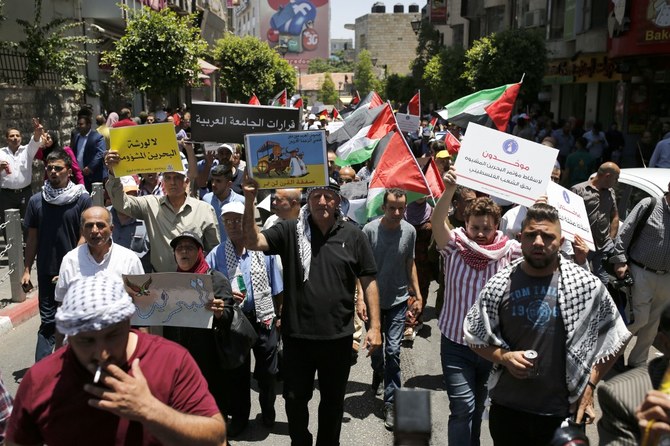
- Two-day meeting billed as the first part of Washington’s long-delayed blueprint to revive the moribund Israeli-Palestinian peace process
- But neither the Israeli nor Palestinian governments will attend the curtain-raising event
Turkiye’s Erdogan criticizes US crackdown on college protests
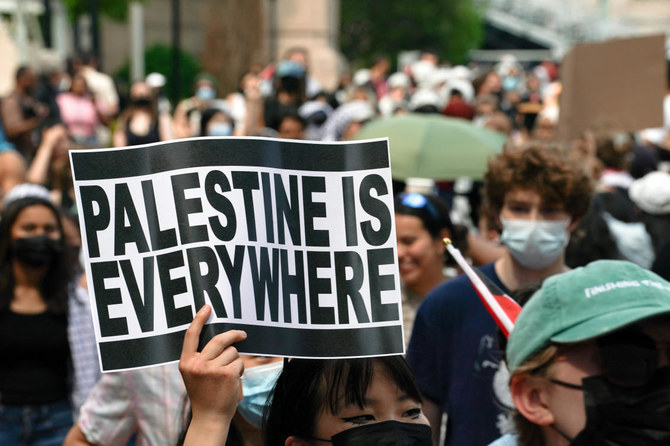
- “Conscientious students and academics including anti-Zionist Jews at some prestigious American universities are protesting the massacre (in Gaza),” Erdogan told an event
- “These people are being subjected to violence, cruelty, suffering, and even torture for saying the massacre has to stop“
ANKARA: Turkish President Tayyip Erdogan waded into the debate over US college campus protests on Thursday, saying authorities were displaying “cruelty” in clamping down on pro-Palestinian students and academics.
Demonstrations have spread on campuses across the United States over Israel’s conduct of the war in Gaza, prompting police crackdowns and arrests at some venues such as Columbia University in New York.
“Conscientious students and academics including anti-Zionist Jews at some prestigious American universities are protesting the massacre (in Gaza),” Erdogan told an event in Ankara.
“These people are being subjected to violence, cruelty, suffering, and even torture for saying the massacre has to stop,” he said, adding that university staff were being “sacked and lynched” for supporting the Palestinians.
Turkiye, a NATO ally of the United States, has sharply criticized Israel’s assault on Gaza and what it calls the unconditional support it receives from Western countries.
The US is a top supplier of military aid to Israel and has shielded the country from critical United Nations votes.
“The limits of Western democracy are drawn by Israel’s interests,” Erdogan said. “Whatever infringes on Israel’s interests is anti-democratic, antisemitic for them.”
More than 34,000 people have been killed in Gaza during Israel’s nearly seven-month military offensive, Palestinian health officials say, after Hamas militants killed some 1,200 people and took 253 hostages during an Oct. 7 assault on southern Israel, according to Israeli tallies.
Israel president says US universities ‘contaminated by hatred, anti-Semitism’

- “We see prominent academic institutions, halls of history, culture, and education contaminated by hatred and anti-Semitism fueled by arrogance and ignorance,” he said
- “We watch in horror as the atrocities of October 7th against Israel are celebrated and justified“
JERUSALEM: Israel’s president on Thursday slammed US universities for campus unrest over Israel’s war in Gaza, saying these institutions were “contaminated by hatred and anti-Semitism.”
Isaac Herzog said in a special broadcast that he was issuing an urgent message of support to Jewish communities amid a “dramatic resurgence in anti-Semitism and following the hostilities and intimidation against Jewish students on campuses across the US in particular.”
“We see prominent academic institutions, halls of history, culture, and education contaminated by hatred and anti-Semitism fueled by arrogance and ignorance,” he said.
“We watch in horror as the atrocities of October 7th against Israel are celebrated and justified.”
His comments came as hundreds of police and protesters were in a tense stand-off at the University of California, Los Angeles and unrest over Israel’s war against Hamas in Gaza continued to spread in campuses across the United States.
Demonstrators have gathered in at least 30 US universities since last month, often erecting tent encampments to protest the soaring death toll in the Gaza Strip.
Israel’s offensive in Gaza has killed at least 34,596 people in Gaza, mostly women and children, according to the Hamas-run territory’s health ministry.
It comes in response to Hamas’s unprecedented attack on Israel on October 7, which resulted in the deaths of 1,170 people, mostly civilians, according to an AFP tally of Israeli official figures.
The militants also took about 250 hostages, 129 of whom remain in Gaza, including 34 presumed dead, Israel says.
The protests against the war have posed a challenge to US university administrators trying to balance free speech rights with allegations of criminal activity, anti-Semitism and hate speech.
In his statement Thursday, Herzog said his message was addressed “to our friends on campuses and in Jewish communities across the United States and all over the world.”
“The people of Israel are with you. We hear you. We see the shameless hostility and threats. We feel the insult, the breach of faith and breach of friendship. We share the apprehension and concern,” he said.
“In the face of violence, harassment and intimidation, as masked cowards smash windows and barricade doors, as they assault the truth and manipulate history, together we stand strong,” he said.
“As they chant for intifada and genocide, we will work — together — to free our hostages held by Hamas, and fight for civil liberties and our right to believe and belong, for the right to live proudly, peacefully and securely, as Jews, as Israelis — anywhere.”
Pointing to Holocaust Memorial Day commemorations next week, the Israeli president said “we will speak of the dark times of the past, and we will remember the miracle of our rebirth.”
“Together, we shall overcome,” he said. “In the face of this terrifying resurgence of anti-Semitism: Do not fear. Stand proud. Stand strong for your freedom.”
Palestinian Embassy seeks temporary status for Gazans who entered Egypt during war
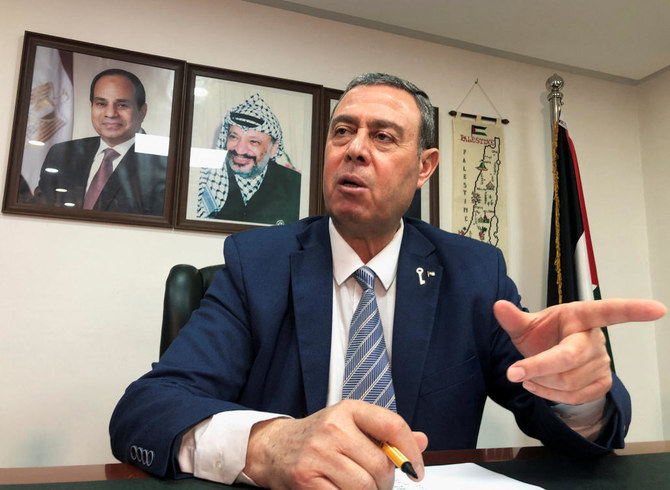
- Diab Al-Louh stressed that residency permits would only be for legal and humanitarian purposes
- Displaced Palestinians in Egypt lack papers to enrol their children in schools, open businesses or bank accounts, travel, or access health insurance
CAIRO: The Palestinian Embassy in Egypt is seeking temporary residency permits for tens of thousands of people who have arrived from Gaza during the war between Israel and Hamas, which it says would ease conditions for them until the conflict is over.
Diab Al-Louh, the Palestinian ambassador in Cairo, said as many as 100,000 Gazans had crossed into Egypt, where they lack the papers to enrol their children in schools, open businesses or bank accounts, travel, or access health insurance — though some have found ways to make a living.
Louh stressed that residency permits would only be for legal and humanitarian purposes, adding that those who arrived since the war began on Oct. 7 had no plans to settle in Egypt.
“We are talking about a category (of people) in an exceptional situation. We asked the state to give them temporary residencies that can be renewed until the crisis in Gaza is over,” Louh told Reuters in an interview.
“We have confidence that our Egyptian brothers will understand this. They have already provided a lot,” he said. “But ... this is an issue of sovereignty being discussed at the highest level.”
Egypt’s State Information Service did not immediately respond to a request for comment.
Egypt has been vocal in its opposition to any mass displacement of Palestinians from Gaza, framing this as part of wider Arab rejection of any repeat of the “Nakba,” or “catastrophe,” when some 700,000 Palestinians fled or were forced from their homes in the war surrounding Israel’s creation in 1948. Palestinian leaders also reject settlement of their people in foreign countries.
During the current war, the Rafah Crossing on the 13-km (8-mile) border between Egypt’s Sinai Peninsula and Gaza has been an entry point for aid deliveries, and has also remained largely open for passenger traffic.
But departures from Gaza, already strictly controlled before the war, have been limited to medical evacuees, foreigners and dual nationals, and Palestinians who pay fees to a company called Hala owned by a prominent Sinai businessman.
‘Things are tough’
Those leaving also need security clearance from Israel and Egypt, which together have upheld a blockade on the enclave since Hamas took power there in 2007.
“We are speaking of 100,000 who are looking forward to the day they can come back to Gaza ... maybe once a truce is reached or the war is ended,” said Louh, a Palestinian Authority official who is himself from Gaza.
“But until this happens, people need to correct their legal status.”
The embassy had already helped facilitate passage for some families to return to Gaza during the war, Louh said. Some Palestinians, including visitors and students enrolled at Egyptian universities, became stranded in Egypt when the war started.
Tens of thousands of Palestinians are thought to have settled after 1948 in Egypt, though numbers were lower than in Jordan, Lebanon and Syria, where the United Nations set up refugee camps. As rules granting Palestinians equal rights to Egyptians were rescinded from around the time of Egypt’s 1978 peace accord with Israel, Palestinians say they experienced increasing difficulties in obtaining documents.
The embassy’s efforts to help Gazans in Egypt have been complicated by a lack of funds and staff. The Palestinian Authority, which has limited autonomy in the occupied West Bank, has been hit by drop in international donor funding and Israel’s withholding of tax revenues it collects on behalf of Palestinians.
“Things are tough, dangerous, and they could become more dangerous,” Louh said, referring to the possibility of a major Israeli incursion into Rafah, where more than a million Gazans have sought shelter near the border with Egypt.
Rebuilding bombed Gaza homes may take 80 years, UN says

- If construction materials are delivered five times as fast as in the last crisis in 2021, re-construction could be done by 2040
- Palestinian data shows that around 80,000 homes have been destroyed
GENEVA: Rebuilding homes in the Gaza Strip could drag into the next century if the pace follows the trend of previous conflicts, according to a UN report released on Thursday.
Nearly seven months of Israeli bombardment have caused billions of dollars in damage, leaving many of the crowded strip’s high-rise concrete buildings reduced to heaps, with a UN official referring to a “moonscape” of destruction.
Palestinian data shows that around 80,000 homes have been destroyed in a conflict triggered by Hamas fighters’ deadly attacks on southern Israel on Oct. 7. Israeli strikes have killed tens of thousands of Palestinians.
The assessment, released by the UN Development Programme, said Gaza needs “approximately 80 years to restore all the fully destroyed housing units.”
However, in a best-case scenario in which construction materials are delivered five times as fast as in the last crisis in 2021, it could be done by 2040, the report said.
The UNDP assessment makes a series of projections on the war’s socioeconomic impact based on the duration of the current conflict, projecting decades of ongoing suffering.
“Unprecedented levels of human losses, capital destruction, and the steep rise in poverty in such a short period of time will precipitate a serious development crisis that jeopardizes the future of generations to come,” said UNDP Administrator Achim Steiner in a statement.
In a scenario where the war lasts nine months, poverty is set to increase from 38.8 percent of Gaza’s population at the end of 2023 to 60.7 percent, dragging a large portion of the middle class below the poverty line, the report said.
Doubts grow over Gaza truce plan

- Israel still waiting for Hamas’s response to the latest proposal
GAZA: Doubts grew on Thursday over the fate of a Gaza truce plan that, as the week began, had raised hopes of an end to nearly seven months of war between Israel and Palestinian Hamas militants.
Israel was still waiting for Hamas’s response to the latest proposal, said an Israeli official not authorized to speak publicly.
Mediators have proposed a deal that would halt fighting for 40 days and exchange Israeli hostages for potentially thousands of Palestinian prisoners, according to details released earlier by Britain.
Any such deal would be the first since a one-week truce in November saw 80 Israeli hostages exchanged for 240 Palestinian prisoners.
The war started with Hamas’s October 7 attack on southern Israel that resulted in the deaths of 1,170 people, mostly civilians, according to an AFP tally based on Israeli official figures.
Israel estimates that 129 captives seized by militants during their attack remain in Gaza, but the military says 34 of them are dead.
Israel’s retaliatory offensive, vowing to destroy Hamas, has killed at least 34,596 people in Gaza — mostly women and children — including 28 over the past day, according to the health ministry in the Hamas-run territory.
Much of Gaza has been reduced to a grey landscape of rubble. The debris includes unexploded ordnance that leads to “more than 10 explosions every week,” with more deaths and loss of limbs, Gaza’s Civil Defense agency said on Thursday.
Hampered aid
Humanitarians are struggling to get aid to Gaza’s 2.4 million people, hundreds of thousands of whom have fled to Rafah, the territory’s southernmost point, the United Nations says.
Senior Hamas official Osama Hamdan told AFP late Wednesday that the movement’s position on the truce proposal was “negative” for the time being.
The group’s aim remains an “end to this war,” senior Hamas official Suhail Al-Hindi said — a goal at odds with the stated position of Israel’s Prime Minister Benjamin Netanyahu.
Regardless of whether a truce is reached, Netanyahu vows to send Israeli troops into Rafah against Hamas fighters there. US officials reiterated their opposition to such an operation without a plan to protect the civilians.
US Secretary of State Antony Blinken has urged the Islamist movement to accept the truce plan.
“Hamas needs to say yes and needs to get this done,” Blinken said Wednesday while in Israel on his latest Middle East mission.
In early April there had also been initial optimism over a possible truce deal, only to have Israel and Hamas later accuse each other of undermining negotiations.
Following a meeting with Blinken, Israel’s opposition leader Yair Lapid insisted that Netanyahu “doesn’t have any political excuse not to move to a deal for the release of the hostages.”
Netanyahu faces regular protests in Israel calling on him to make a deal that would bring home the captives. On Thursday protesters set up over-sized photos of women hostages outside Netanyahu’s Jerusalem residence. In Tel Aviv they again blocked a highway.
Israel protests
Demonstrators accuse the prime minister, who is on trial for corruption charges he denies, of seeking to prolong the war.
Fallout from the Gaza fighting has spread throughout the Middle East, including to the Red Sea region where commercial shipping has been disrupted.
US and allied warships have regularly shot down suspected drones and missiles fired by Iran-backed Yemeni rebels who say they act in solidarity with Palestinians.
Criticism of the war has intensified in the United States, Israel’s top military supplier.
Demonstrations have spread to at least 30 US universities, where protesters have often erected tent encampments to oppose Gaza’s ever-increasing death toll.
Talks on a potential deal to pause the bloodiest-ever Gaza war have been held in Cairo involving US, Egyptian and Qatari mediators.
Mairav Zonszein, senior analyst at the International Crisis Group think-tank, said he was pessimistic Hamas would agree to a deal “that doesn’t have a permanent ceasefire baked into it.”
A source with knowledge of the negotiations said on Wednesday that Qatari mediators expected a response from Hamas in one or two days.
The source said Israel’s proposal contained “real concessions” including a period of “sustainable calm” following an initial pause in fighting, and the hostage-prisoner exchange.
The source said Israel’s withdrawal from Gaza remained a likely point of contention.
Egypt’s mediation
Egypt was involved in a flurry of calls “with all the parties,” the country’s state-linked Al-Qahera News reported, citing a high-level Egyptian official who spoke of “positive progress.”
Martin Griffiths, the UN aid chief, this week said “improvements in bringing more aid into Gaza” cannot be used “to prepare for or justify a full-blown military assault on Rafah.”
The US military since last week has been building a temporary pier off Gaza to assist aid efforts. The pier is now more than half finished, the Pentagon said on Wednesday.
In Khan Yunis city near Rafah, foreign aid and borrowed equipment helped to “almost completely” restore the emergency department at Nasser Medical Complex, said Atef Al-Hout, the hospital director.
Intense fighting raged in mid-February around the hospital, which Israeli tanks and armored vehicles later surrounded.
Israel’s army on Thursday said that among strikes over the previous day, a fighter jet hit “a military structure in central Gaza.”
Witnesses and an AFP correspondent on Thursday reported air strikes in Khan Yunis and artillery bombardment in the Rafah area, while militants and Israeli troops battles in Gaza City to the north.
Also in north Gaza, workers unloaded boxes of aid at Kamal Adwan hospital where Alaa Al-Nadi’s son lay motionless in the intensive care unit, his head almost completely swathed in bandages.
Nadi, her own arm bandaged after they were wounded in a strike, feared the hospital’s power could go out, cutting the boy’s oxygen and killing him.
“I call on the world to transfer my son for treatment abroad. He is in a very bad condition,” she said, breaking down in tears.




